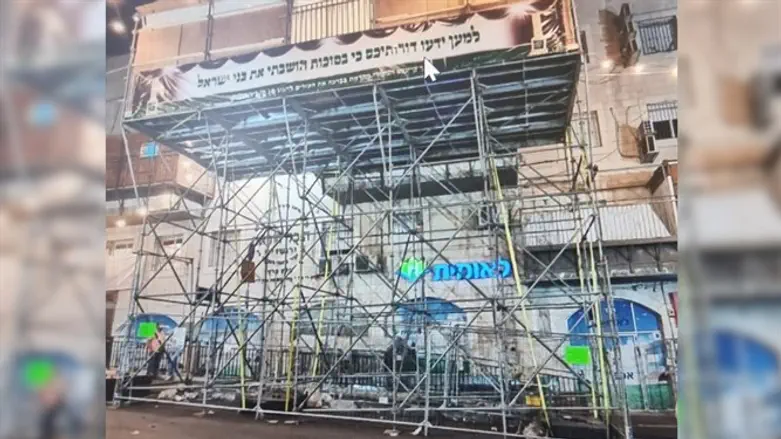
On Sunday evening, police arrived at the sukkah belonging to Rabbi Yitzhak Meir Morgenstern in Romema, Jerusalem, and informed the owners that it was to be dismantled. Shortly afterward, municipal inspectors arrived at the scene and began the work of dismantling the structure, which, according to Behadrey Haredim, is constructed in a similar fashion every year.
This year, however, police claimed that the sukkah lacked the requisite permits and that it posed a threat to the safety of the public. No objections were raised, and the sukkah was taken apart.
The night before, however, an hours-long standoff resulted after over 200 police officers arrived in the Meah Shearim neighborhood of Jerusalem in order to dismantle the sukkah belonging to Rabbi Moshe Bransdorfer. This sukkah, too, has been built in the same fashion for years. It extends from a second-floor apartment and is supported on iron scaffolding, and according to accounts provided to Behadrey Haredim, it had been approved by none less than the Jerusalem Municipality’s own choice of engineer.
Nonetheless, several private individuals and a medical clinic situated near the sukkah complained to police, who in turn claimed that the sukkah was a public hazard.
“The sukkah was built on high scaffolding and posed a real risk to life and property, while harming passersby and the public using the medical center located there, which even filed a complaint to the municipality,” the police stated.
The saga began last Tuesday, when police made their first visit to the sukkah and a spontaneous protest erupted. Eventually, Rabbi Bransdorfer came to an agreement with police and the municipality, according to which the sukkah would be dismantled by his family the next day. Apparently this did not occur, and the municipality then offered an alternative site for the sukkah. The offer was accepted, but then representatives of Rabbi Bransdorfer appealed to the court for a stay of execution of the demolition, which was not granted.
The case was due to be heard in court on Sunday, but police decided to take action on the Saturday night preceding, and arrived in huge numbers, prepared for the fierce protests that indeed erupted.
Police arrived with trucks and cranes, raided the adjacent building, evacuated everyone from the sukkah and the apartment, and then began to demolish the structure.
According to attorney Shreiber, representing Rabbi Bransdorfer’s family, several of the claims made by those demanding the demolition are false, including a claim made by the health clinic that the sukkah blocked access to it, which is blatantly untrue as photographs showed. In addition, the sukkah obtained the approval of two engineers and was built according to the engineers’ instructions, including protective fencing placed around the scaffolding.
“Every single year, engineers inspect the sukkah and the same was true this year,” one source told Behadrey Haredim. “The sukkah complied with the most stringent safety measures. But due to pressure from social media, the municipality decided to issue a demolition order regardless.”